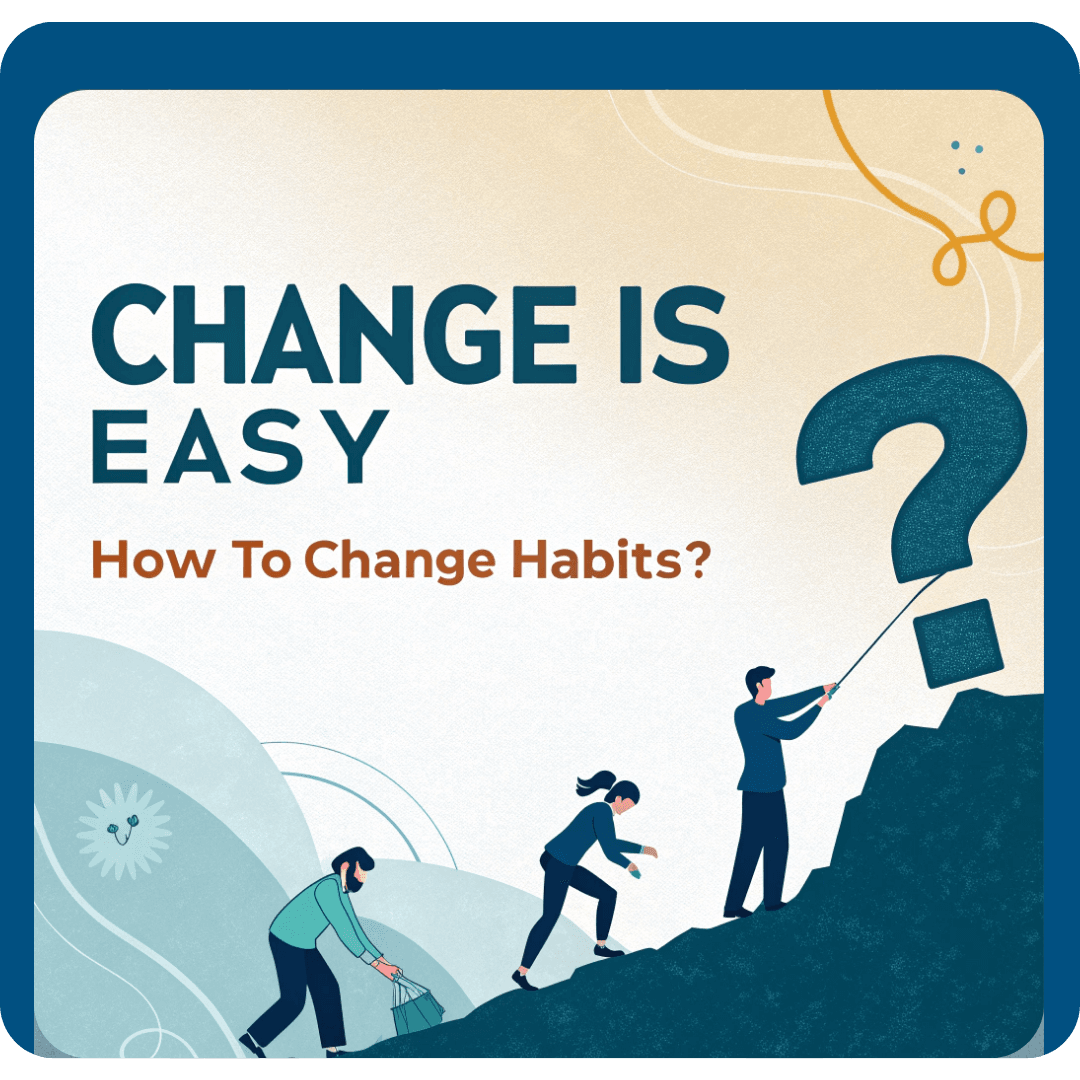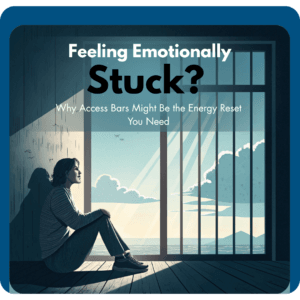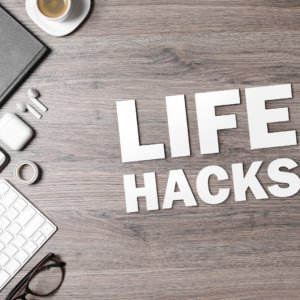Change is Easy
“The only constant in life is change” Heraclitus, Greek Philosopher.
Change is inevitable in this ever-so dynamic world. Yet we resist and react to change unless it is out of an aberration or danger. In the past few years, the Pandemic has created fissures in the old structures, forms, and significances and paved the way for the ‘new normal’. This new world demands a much faster rate of change and resilience. It requires us to look at our own old beliefs, thoughts, perceptions, and expectations that no longer works for us. Here are a few insights into why change is hand and what can we do to have ease with it?
How many of us find change difficult, challenging, tedious, unfavorable? There may be some specific areas in our lives where we feel change is difficult. It could be your habit, relationship, body, finances, or anything else. For instance, people who struggle with their weight. No matter how much they exercise or diet, the weight doesn’t seem to budge. Relationships are even harder to change. No matter how much people try to communicate, compromise, they aren’t able to have the relationship they desire with that person. Habits have a reputation to be difficult to change, be it addiction or the simplest of the habits of getting up early in the morning.
Now would be a good time to look at the basic and fundamental reasons why change is so difficult.
Social conditioning
The point of views we form about ‘change’ itself can be limiting to create a change. The best place to start unlocking these limitations is to ask a question: Whose point of views about change am I buying into that doesn’t allow me to change with ease?
Our brains are hardwired for familiarity, which makes change difficult. We are socialized from an early age to look for solace in the familiar. Deeply rooted habits and routines that feel safe and predictable are formed as a result of this conditioning.
Our minds see each change as a danger to this security. It sets off a stress reaction that makes the fight-or-flight reflex active. Furthermore, creating new habits and kicking old ones is often necessary for change. It requires patience, perseverance, and time to reroute a well-traveled trail through a dense forest.
The value of not changing
The other reason why we can’t change something is because it serves us something. We’ve been used to it like a comfortable blanket that gives our life a sense of stability and security. As long as we don’t acknowledge the benefits of it, we can’t change it. The status quo is a representation of our everyday lives, complete with routines, relationships, and habits. We are comfortable with it, so even though it’s not ideal, that familiarity brings us comfort.
Entering the unknown entails entering a state of transformation. It is similar to leaving behind a comfortable blanket in favor of something unknown and possibly difficult.
Also, even when it conflicts with our long-term objectives or preferences, the status quo frequently provides instant advantages or rewards. What is the value or benefit for not changing? Is a question we need to ask ourselves if we find changing something difficult
Fear of the unknown
The fear of the unknown is so powerful that it can convince us to stay in the misery of our current situation rather than change. A change is misidentified as losing control over the known. Known is comforting; whereas the unknown can be out of control. As our brains are programmed to seek security and consistency, we naturally resist change. Being out of control, limitations, definitions and structures is what creates a new reality – be it with relationships, body, finances or health. The false sense of control can only be broken with unconditional trust in self. With trust, comes ease and that in turn creates change.
What would it take me to trust myself unconditionally?
–
Sonali Mittra is a certified therapist, a transformation coach, Founder of Treta Foundation. Suvanjali Lama is a research associate, Treta Foundation, India.
Because our brain loves the familiar—old habits, routines and social conditioning make change feel unsafe.
Often it gives comfort, status quo, or small rewards—so it feels easier than the uncertainty of change.
We resist change because unknown feels like we lose control; fear makes us stay in discomfort.
Yes—when we trust ourselves, question old beliefs, and shift perspective, change becomes less resistance and more flow.
Start by noticing small decisions, honoring them, being kind to yourself when you mess up, and stepping into little unknowns.
Identify one habit you want to shift, break it into tiny action, and practise slowly rather than trying to overhaul everything at once.
Yes. Beliefs from family, society often tell us what’s “safe”—challenging them helps create new possibilities.
It varies. Some shifts happen quickly with awareness; others take patience, repetition, and practice.
Usually yes—but discomfort can be a sign of growth. Over time, ease grows as new ways become familiar.
When resistance, stress, and unhappiness persist despite effort—it might be a sign that letting go or acceptance is a healthier path.





This blog beautifully encapsulates the essence of transformation. The insights on social conditioning and the fear of the unknown truly resonate. It’s enlightening to realize that ‘change is easy’ when we shift our perspective and trust ourselves. Thank you for this inspiring piece!
I’ve always believed that change equates to growth, but this article provided a deeper understanding of the internal barriers we face. Embracing the unknown is challenging, but this read offers a roadmap. Thank you!
The section about the value of not changing hit home. It’s intriguing how we often cling to familiar habits, even when they’re detrimental. Recognizing this is the first step towards meaningful change.
I’ve been struggling with personal growth, and this piece made me realize that my resistance to change stems from a fear of losing control. Trusting oneself is indeed the first step. Grateful for this insightful read.
This article truly resonated with me. I’ve always viewed change as a daunting task, but understanding the role of social conditioning and our inherent fear of the unknown offers a fresh perspective. Thank you for shedding light on this!
Thank you for breaking down something so complex in such a peaceful and empowering way. I’m beginning to feel that change is easy when we trust the process.
The timing of this couldn’t be better. I’ve been going through a big transition and needed to hear that change is easy when we stop fighting it. So grateful for your words!
I love the simplicity of your message. We always think transformation requires struggle, but you’ve shown that change is easy and even natural when we’re aligned within.
This resonates so much! Especially the part about letting go of control. Change is easy once we stop trying to micromanage life. Thank you for this beautiful message.
I never thought I’d hear the words change is easy and actually believe them. But after reading this, I feel something shift. Powerful writing!
Reading this felt like a deep breath. I’ve been overwhelmed lately, but your words made me believe that change is easy when we come back to ourselves. Truly inspiring!
Wow, such a refreshing perspective! I’ve always felt stuck in old patterns, but this post gave me hope that change is easy if I just start with one small step.
This blog made me realize how much I overcomplicate things. Your approach really shows that change is easy when we stop resisting it. Thank you for this gentle reminder!
This reaffirmation that ‘change is easy’ if we approach it thoughtfully was uplifting. The blog makes transformation feel within reach
I’ve been stuck in comfort zones, but reading that ‘change is easy’ with the strategies you shared gave me hope and clarity.
The way you described that ‘change is easy’ when we break it into smaller steps felt like a weight lifted. Looking forward to trying this!
Your writing made me believe that ‘change is easy’ can be a reality. The mindset exercises are simple yet powerful—thank you!
Great article! Embracing the idea that ‘change is easy’ really helps reduce the fear of starting. I appreciate the actionable steps.
Love how you framed ‘change is easy’ as a gradual process, not a leap. The examples you shared made it feel super accessible.
The reminder that ‘change is easy’ when we adjust our mindset is liberating. This article is exactly what I needed to read this week.
Your insight on how small habits reinforce that ‘change is easy’ was spot on. I’m excited to start implementing your suggestions today.
As soon as I read ‘change is easy’, I felt that—this blog gave me practical tips that actually feel doable. Thank you for breaking it down so clearly!
This post about ‘change is easy’ really resonated with me. I love the way you simplify mindset shifts—it’s so empowering!
Change is easy’—what a powerful affirmation. This piece gave me the gentle nudge I needed today to stop fearing the shift and start flowing with it. Truly inspiring.
This blog beautifully breaks the myth that transformation has to be hard. I loved the part where you said change is easy when it comes from a place of awareness—so relatable and true!
I’ve been resisting change for a while but your blog made me realize that change is easy when approached with the right mindset. Thank you for this!
This post reminded me that change is easy when we let go of old fears. Such a simple yet powerful message — loved it!
Reading this reminded me that we often complicate our own healing journeys. Your message that change is easy when we stop resisting really hit home. Thank you for simplifying something so profound.
This post beautifully captures the truth that change is easy when we let go of fear and trust the inner process. Thank you for reminding us that transformation doesn’t have to be hard or painful!
I loved seeing how trust in oneself can dismantle that fight-or-flight reaction. Change is Easy isn’t just a phrase—it can become a lived experience, thanks to this piece.
As someone who’s struggled with breaking old habits, your line—what value does the status quo serve us?—opened my eyes. Change is Easy when I recognize what I’m holding onto. Grateful for your insights!
This reflection on fear of the unknown hit home. You’ve made me realize that Change is Easy when we shift our mindset from resistance to trust. Deeply inspiring article!
I really appreciated the point about social conditioning holding us back. Change is Easy becomes real when we acknowledge these unseen blocks—and this post laid that out beautifully. Thank you!
Reading your post really made me pause—Change is Easy doesn’t just sound like a slogan, but a mindset we can actually adopt. Turning discomfort into growth and transforming regret into action is such a powerful reminder that we don’t have to stay stuck. Thank you for reframing change as something accessible and even welcoming 🌱. This feels like a gentle invitation to take one small step toward my own transformation today.
Really loved reading your post—your explanation of why change is easy when we shift our mindset struck a chord with me. The way you broke down the fear of the unknown and the value of not changing made me pause and reflect on my own habits. Thank you for such clear, accessible insights!
So true — we often hold on to what feels familiar even if it’s not working anymore. Change is uncomfortable but staying stuck feels worse. Thanks for helping me see that I don’t need to rush, just keep moving.
This article reminded me of how I stayed in the same job for years because it felt “safe”, even though I was unhappy. It took so long to trust myself. Reading this made me feel like I made the right choice finally.
Change has always scared me, especially when I don’t know what’s on the other side. Your message made me think that maybe the first step doesn’t have to be perfect — it just has to be taken. Really inspiring.
I felt this so deeply. We all say we want to change, but when the moment comes, comfort wins. Your words reminded me of how I always delay things even when I know they’re good for me. Thank you for putting this human struggle into simple understanding
I liked how you explained the “value of not changing.” It made me think of how I stayed in a routine that bored me simply because it made me feel in control. Your writing made the whole idea of change feel less like a project and more like something we can ease into without drama. Really refreshing.
What stood out for me was the gentleness of the message. I’m someone who gets overwhelmed easily, and anything about ‘change’ usually stresses me out. But the way you described it — like shifting your posture instead of climbing a mountain — actually relaxed me. It’s rare to read something that doesn’t push or guilt-trip you.
I appreciate how this article frames change as a process of unlearning, not just doing. The section on social conditioning especially made me question a lot of beliefs I’ve taken for granted.